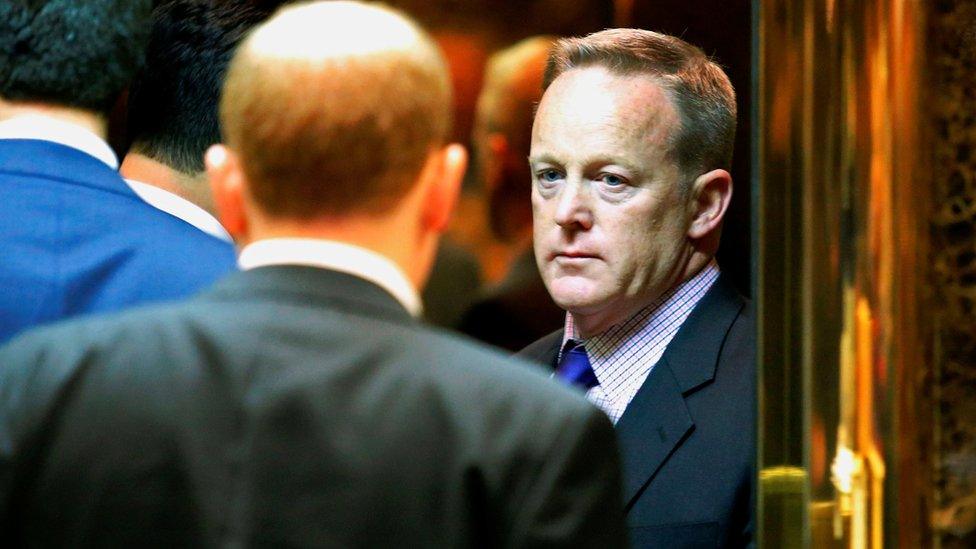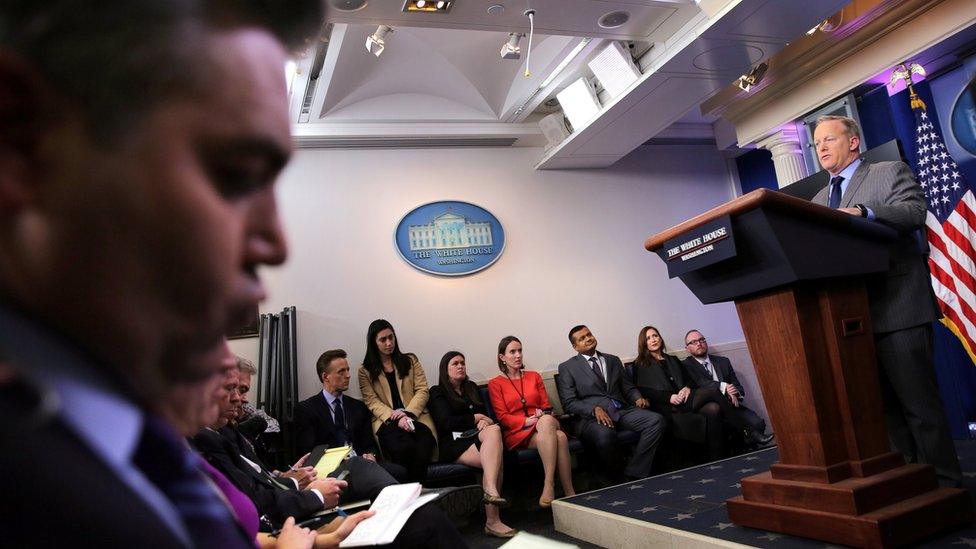Sean Spicer: Who is President Trump's spin doctor?
- Published

Mr Spicer is a Washington PR veteran
In a 2014 lecture to students at his former high school, Sean Spicer outlined a set of 17 "rules for life" that they would be wise to follow.
Rule number 16, he told the students at Portsmouth Abbey in Rhode Island: "Follow your mom's advice: It's not what you say, but how you say it. The tone and tenor of your words count."
The now White House press secretary also told students that they should be true to themselves. Rule number eight, was relevant here, he said, external. "Trust your gut. If it does not feel right, use caution."
With that guidance in mind, Mr Spicer's bellicose press conference with the White House press corps on Saturday suggests that the new presidential spokesman will not sugar-coat his words over the next four years.
While the press secretary-journalist relationship is naturally an adversarial one, Mr Spicer has, in his first few days in the role, already cast himself as being in open conflict with much of the mainstream media, pledging to "hold the press accountable".
This, it appears, is the frontline of a strategy that White House Chief of Staff Reince Preibus described as a will to "fight back tooth and nail every day" at supposed media efforts to "delegitimise" the president.
Sean Spicer, White House press secretary said "no-one had numbers" for the inauguration
Mr Spicer, 45, is not a new hand at managing negative press coverage.
He previously served as spokesman and chief strategist for the Republican National Committee (RNC) and has long criticised coverage of his party and Mr Trump.
Past criticism of Trump
He took the post of communications director at the RNC in 2011, a time when it "was deep in debt and had a badly tarnished brand", according to the Republican Party website, external.
He is said to have helped turn around its fortunes by boosting the social media team, leading rapid response efforts to combat attacks, setting up an in-house video and production team and expanding the use of surrogates - people who can publicly appear on behalf of candidates, defend them and boost their appeal.
Trump attacks 'dishonest' media
How will US media cover President Trump
Mr Spicer has not shied away from criticising Mr Trump in the past. In July 2015, speaking on behalf of the RNC after Mr Trump questioned Republican Senator John McCain's status as a war hero, he said that there was "no place in our party or our country for comments that disparage those who have served honourably".

Mr Spicer claimed President Trump's inauguration was the "largest inaugural crowd ever"
He also described Mr Trump's June 2015 comments about Mexican immigrants being rapists and criminals as not being "helpful to the cause".
Before joining the RNC, he worked as Assistant US Trade Representative for Media and Public Affairs in the George W. Bush administration: a role that involved promoting the kind of free trade that his boss now fiercely criticises as being unfair for the American worker.
Still, Mr Spicer was loyal to Mr Trump on the campaign trail even as the path-breaking candidate split the party and many Republican luminaries distanced themselves from him.
The broad-shouldered, compulsively gum-chewing Republican ("Two and a half packs by noon," he told the Washington Post) is a long-time member of the US Navy Reserve.
He received a Masters degree in National Security and Strategic Studies from the Naval War College in Newport in 2012 and is known to be fierce, and deeply competitive.
One editor who has been blasted many times by Mr Spicer told the Post , externalthat her young child recognises his voice on the phone and bursts into tears.
His wife Rebecca is the chief of communications at the National Beer Wholesalers Association and previously worked in the Bush White House after a career in television news.
As press secretary, Mr Spicer will serve as President Trump's most visible spokesman, and is expected to hold daily televised media briefings, though he has spoken of his desire to shake up the way White House media is managed.
While he has said that Mr Trump will do press conferences, he also wants to utilise technology to "have a conversation with the American people and not just limit it through the filter of the mainstream media".
He has also described White House press briefings as having become "somewhat of a spectacle". Many would use that word to describe the first under the Trump administration.